1031 Exchange Advisors are specialized professionals who guide individuals and businesses through the process of a 1031 exchange, a provision in the U.S. tax code that allows the deferment of tax liabilities when selling a property and reinvesting the proceeds into a "like-kind" property. These advisors, often attorneys, certified public accountants (CPAs), or qualified intermediaries (QIs), are experts in real estate, tax law, and the intricacies of Section 1031 of the Internal Revenue Code (IRC). They navigate clients through the exchange process, manage strict deadlines, ensure adherence to IRS rules, identify suitable replacement properties, and prepare the necessary documentation. Therefore, working with a 1031 Exchange Advisor can simplify the complex process and help maximize the financial benefits of a 1031 exchange. 1031 Exchange Advisors play a crucial role in the complex and often confusing process of executing a successful 1031 exchange. They help the taxpayer identify suitable replacement properties, manage the strict deadlines, ensure adherence to IRS rules, and prepare the necessary documentation. The 1031 exchange process has two critical timelines: the identification period (45 days) and the exchange period (180 days). Advisors guide clients through these stages, ensuring they meet all requirements within the stipulated timeframes to qualify for the tax deferral benefits. The role of a 1031 Exchange Advisor is critical in managing timelines. If a taxpayer fails to meet either of the two timelines, the IRS may disqualify the transaction from the 1031 exchange treatment, resulting in substantial tax liabilities. Advisors ensure the exchange is within the ambit of IRS regulations. They assist in determining if the properties involved are "like-kind," a requirement for a valid 1031 exchange, and confirm that both properties are held for productive use in a trade or business or for investment. Experience is paramount when choosing a 1031 Exchange Advisor. Advisors with a successful track record in handling 1031 exchanges can navigate the process effectively. Ask potential advisors about their experience with different types of exchanges, including delayed, simultaneous, reverse, and construction or improvement exchanges. A competent 1031 Exchange Advisor should have a deep understanding of tax law, real estate transactions, and specific rules around 1031 exchanges. They may be attorneys, certified public accountants, or qualified intermediaries. It's essential to verify their qualifications to ensure they have the requisite knowledge and skills. Regular communication with your advisor is crucial throughout the exchange process. They should provide updates about critical dates, potential issues, and progress toward closing on the replacement property. Assess if their communication style aligns with your preferences to prevent misunderstandings and ensure the process runs smoothly. Before engaging a 1031 Exchange Advisor, it's important to understand their fee structure. The cost of services may vary depending on the complexity of the exchange. Make sure to discuss fees upfront to avoid surprises down the line. A qualified 1031 exchange advisor should have extensive knowledge of the IRS's 1031 exchange regulations. This knowledge enables them to guide investors through the process accurately, avoiding missteps that could lead to denied tax deferments. Experience matters in the 1031 exchange landscape. Advisors with a history of managing successful exchanges have honed their ability to foresee and address potential complications, ensuring a smooth transaction. They've also likely developed strong relationships with other professionals involved in the process, which can be beneficial. While there is no specific licensing requirement for QIs, it's wise to look for advisors who hold relevant certifications. Certifications from organizations like the Federation of Exchange Accommodators (FEA) demonstrate a commitment to industry standards and ongoing professional development. 1031 exchange advisors handle substantial amounts of money during the exchange process, so it's crucial that they demonstrate strong ethical standards. They should maintain complete transparency and regular communication throughout the transaction. Given the substantial financial transactions they manage, 1031 exchange advisors should have a robust Errors and Omissions (E&O) insurance policy, as well as fidelity bond coverage. These protect clients in the event of errors, fraud, or theft. Finally, hearing from past clients can provide valuable insight into an advisor's professionalism, reliability, and effectiveness. Positive testimonials and reviews speak to an advisor's reputation and performance. The initial consultation with a 1031 Exchange Advisor typically involves discussing your goals for the exchange, reviewing potential replacement properties, and developing a timeline for the process. The advisor will also explain their role and responsibilities and outline the fees for their services. 1031 Exchange Advisors assist with all necessary documentation and paperwork for the exchange. This includes preparing the Exchange Agreement, Assignment Agreement, and Notice of Assignment, among other documents. They also coordinate with other parties involved in the transaction, such as real estate agents and closing agents, to ensure a smooth process. Regular communication with your 1031 Exchange Advisor is essential throughout the exchange process. They should provide updates about key dates, potential issues, and progress toward closing on the replacement property. Good communication can help prevent misunderstandings and ensure that the exchange process goes as smoothly as possible. 1031 Exchange Advisors manage various types of exchanges, each coming with its unique set of requirements. The primary categories include: Delayed Exchanges: This is the most common type of 1031 exchange. It involves selling a property first and acquiring a replacement property within a specific timeframe. Simultaneous Exchanges: As the name suggests, the sale of the relinquished property and the purchase of the replacement property co-occur. Reverse Exchanges: In these exchanges, the replacement property is acquired before selling the original property. Construction or Improvement Exchanges: These exchanges involve using the equity from the sale of the relinquished property to improve or construct on the replacement property. 1031 Exchange Advisors is adept at managing transactions involving diverse property types. As long as both the relinquished and replacement properties are held for productive use in a trade, business, or for investment, they can potentially qualify for a 1031 exchange. This includes commercial properties, residential rental properties, agricultural lands, and more. Beyond standard property exchanges, 1031 Exchange Advisors are also proficient in dealing with more complex transactions. These can include scenarios involving multiple properties or fractional ownership interests. In such situations, their expertise is invaluable to ensure the transaction meets all IRS requirements and maintains the advantages of a 1031 exchange. 1031 Exchange Advisors are pivotal in assisting investors in navigating the intricate process of 1031 exchanges, offering expertise in tax law, real estate, and IRS rules. They manage stringent timelines, identify potential replacement properties, and facilitate documentation to ensure compliance. The selection of an advisor involves diligent assessment of their qualifications, experience, and communication style. An initial consultation allows the alignment of goals, while ongoing communication ensures a smooth exchange process. Advisors handle various types of exchanges and properties, even complex transactions involving multiple properties. With the evolving tax legislation and real estate trends, their role may shift to adapt to changes, emphasizing their necessity in successful 1031 exchanges. Hence, choosing a competent 1031 Exchange Advisor is a crucial step to optimize the financial benefits of these exchanges.What is 1031 Exchange Advisors?
Role and Responsibilities of 1031 Exchange Advisors
Key Responsibilities
Navigate the 1031 Exchange Process
Timelines in 1031 Exchanges
Advisors' Role in Ensuring Compliance With IRS Regulations
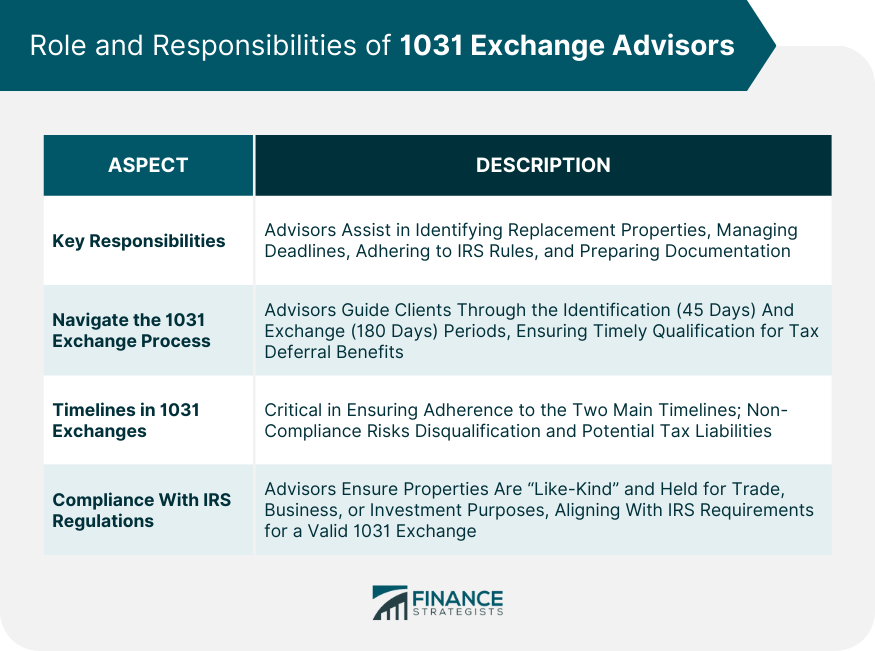
How to Select a 1031 Exchange Advisor
Evaluate Experience
Consider Qualifications
Assess Communication Style
Understand Fee Structure
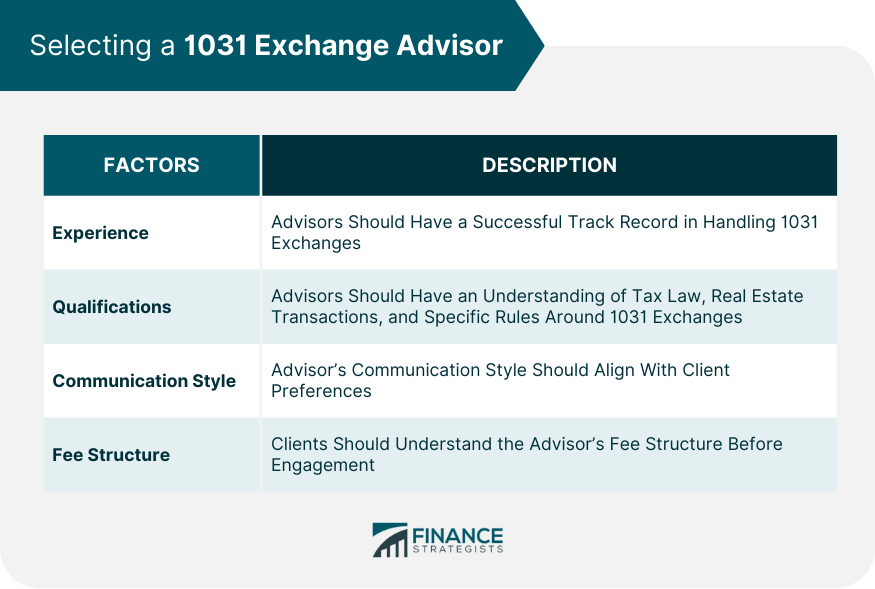
Essential Qualifications of 1031 Exchange Advisors
In-Depth Knowledge of 1031 Exchanges
Relevant Experience
License and Certification
Strong Ethical Standards
Robust Insurance Coverage
Positive Client Testimonials
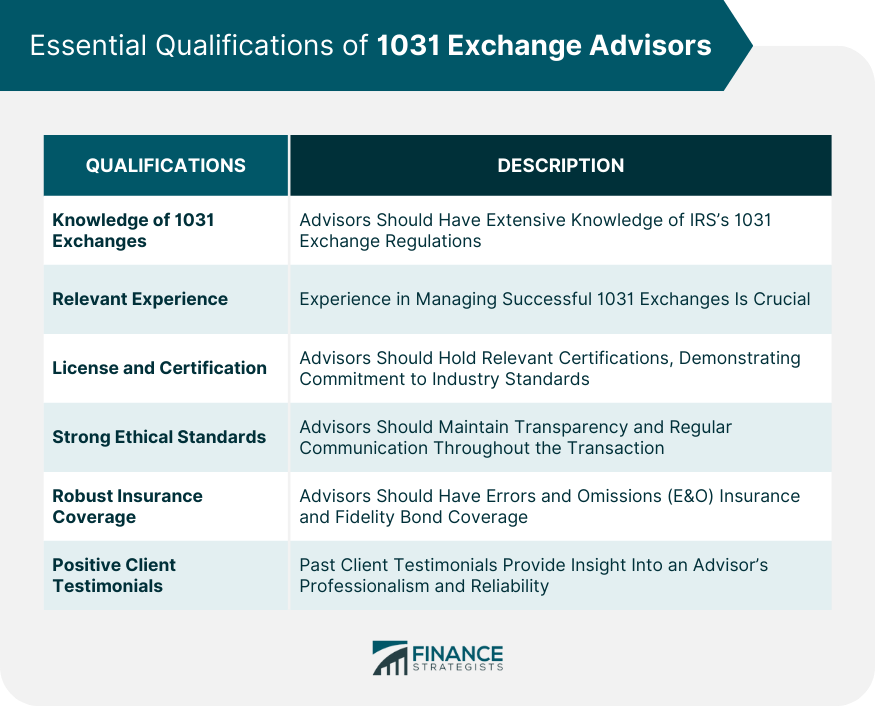
Work With 1031 Exchange Advisors
Initial Consultation With 1031 Exchange Advisors
Documentation and Paperwork in Collaboration With 1031 Exchange Advisors
Communication With 1031 Exchange Advisors During the Exchange Process
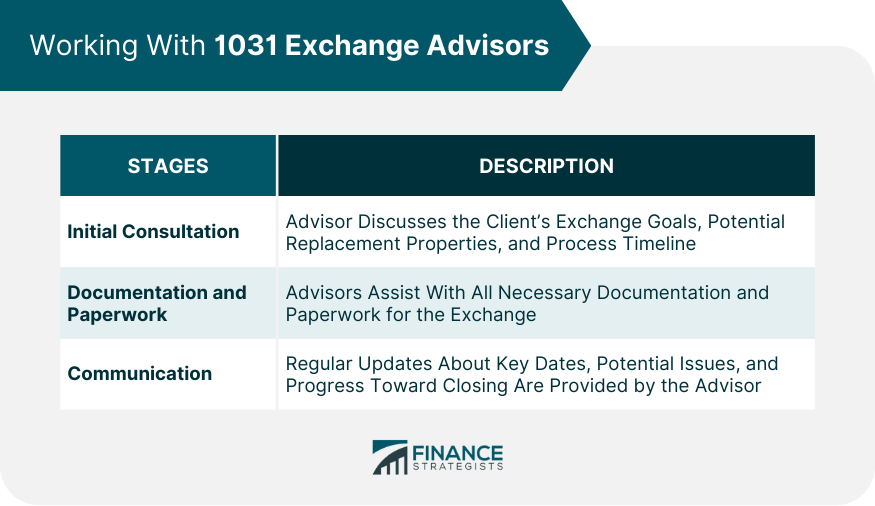
Types, Properties, and Transactions Handled by 1031 Exchange Advisors
Types of 1031 Exchanges
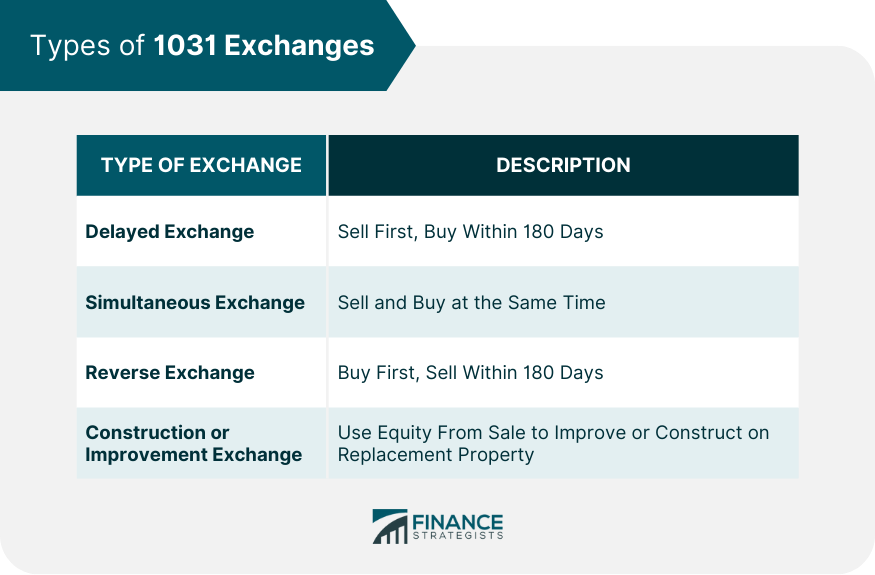
Variety of Property Types
Handle Complex Transactions
Conclusion
1031 Exchange Advisors FAQs
A 1031 Exchange Advisor guides individuals and businesses through a 1031 exchange, ensuring compliance with tax law, identifying suitable like-kind properties, managing timelines, and preparing necessary documentation.
Navigating a 1031 exchange can be complex due to strict IRS regulations and timelines. A 1031 Exchange Advisor brings expertise and experience to help ensure a successful exchange and maximize the financial benefits of tax deferment.
A competent 1031 Exchange Advisor should have a thorough understanding of tax law, real estate transactions, and specific rules around 1031 exchanges. They can be attorneys, certified public accountants, or qualified intermediaries with a successful track record in managing 1031 exchanges.
Choose a 1031 Exchange Advisor based on their qualifications, experience with 1031 exchanges, communication style, and fee structure. Don't hesitate to ask potential advisors about their experience and success rate in handling exchanges.
Yes, 1031 Exchange Advisors are equipped to handle complex exchanges, including those involving multiple properties or fractional ownership interests. Their expertise is invaluable in ensuring that these complex transactions meet all IRS requirements.
True Tamplin is a published author, public speaker, CEO of UpDigital, and founder of Finance Strategists.
True is a Certified Educator in Personal Finance (CEPF®), author of The Handy Financial Ratios Guide, a member of the Society for Advancing Business Editing and Writing, contributes to his financial education site, Finance Strategists, and has spoken to various financial communities such as the CFA Institute, as well as university students like his Alma mater, Biola University, where he received a bachelor of science in business and data analytics.
To learn more about True, visit his personal website or view his author profiles on Amazon, Nasdaq and Forbes.











